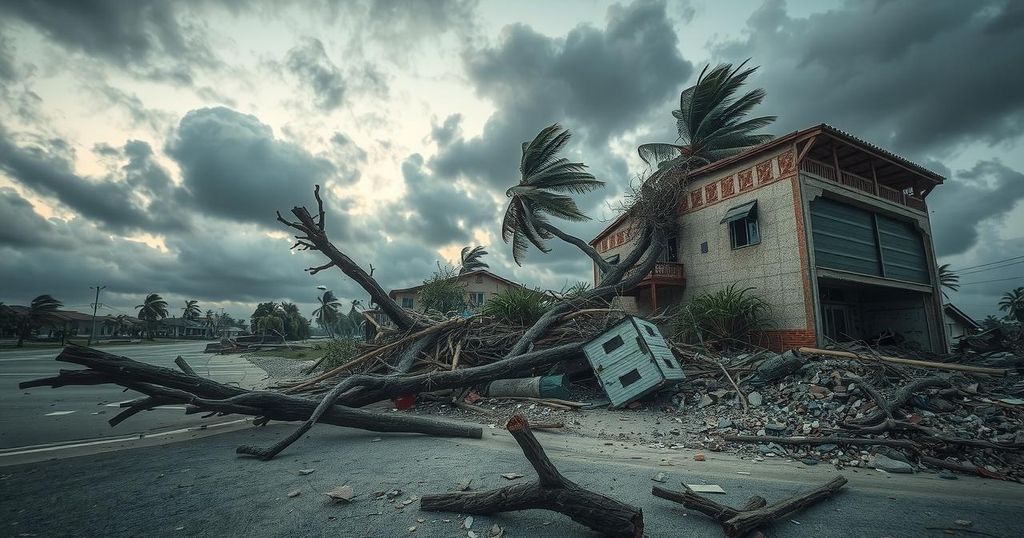Recent disasters including Cyclone Chido and a 7.3-magnitude earthquake in Vanuatu have inflicted severe damage and humanitarian crises. Cyclone Chido impacted Mayotte, Comoros, and Mozambique, while Vanuatu faced widespread destruction from an earthquake. Direct Relief is actively engaged in assessing needs and delivering essential medical supplies to aid affected communities.
Over the weekend, Tropical Cyclone Chido wreaked havoc across the Mayotte archipelago, Comoros, and Mozambique, resulting in catastrophic damage and loss of life. This disaster was compounded by a subsequent 7.3-magnitude earthquake in Vanuatu, exacerbating the already precarious situation for vulnerable communities facing immense challenges. Cyclone Chido has been labeled the most powerful storm to impact Mayotte in over nine decades, with wind speeds surpassing 140 miles per hour and storm surges reaching 28 feet. Entire neighborhoods, particularly those housing undocumented migrants, were obliterated. Although the official death toll in Mayotte stands at 22, estimates suggest the number of casualties may rise into the thousands as damage assessments progress.
In Comoros, Cyclone Chido caused similar devastation, prompting President Azali Assoumani to declare a week of mourning for the lives lost as he noted the significant infrastructure damage. Mozambique also faced the ruthless impact of the cyclone, sustaining severe weather conditions including winds exceeding 160 miles per hour and torrential rains that inflicted harm on homes, infrastructure, and health facilities in Cabo Delgado province.
Direct Relief is actively assessing the needs of communities affected by Cyclone Chido. In Mayotte, the organization is collaborating with local French emergency responders to address immediate healthcare requirements. In Comoros, Direct Relief is coordinating with Santé Diabète to evaluate the situation and extend support. Meanwhile, outreach efforts to Mozambique’s Ministry of Health are ongoing, with Direct Relief offering emergency medical supplies and logistical assistance as damages are fully assessed.
In the Pacific, a strong 7.3-magnitude earthquake struck Vanuatu, with assessments indicating extensive destruction to homes, public infrastructure, and healthcare facilities. The presence of aftershocks continues to pose additional risks to affected communities. Direct Relief is working closely with healthcare partners to identify urgent needs and is dispatching emergency medicines and medical supplies to assist the island nation this week.
Natural disasters such as earthquakes and cyclones present severe and long-lasting threats to human health, causing immediate trauma, widespread injuries, and overwhelming local health infrastructures. The aftermath of such events increases the risk of disease outbreaks due to contaminated water sources, heightened displacement risks leading to overcrowding in shelters, and disruptions in access to chronic disease care. Vulnerable populations, including pregnant women and infants, are particularly at risk when health services are interrupted, complicating emergency obstetric care access.
Direct Relief’s deep commitment to disaster response is evident through its long-standing history of mobilizing medical resources to some of the world’s most affected regions. Following Cyclone Idai in 2019, Direct Relief facilitated the delivery of over 100 tons of medical aid to Mozambique, Zimbabwe, and Malawi. In Vanuatu, the organization has consistently offered support after various cyclones and earthquakes, pre-positioning resources and collaborating with local healthcare providers to ensure timely medical assistance in times of calamity.
Through initiatives following the devastating 7.8-magnitude earthquake in Türkiye and Syria, Direct Relief delivered more than 1,000 tons of medical aid, including essential supplies to frontline responders. Similarly, after the 2015 Nepal earthquake, support was provided to healthcare providers for emergency medical supplies. In the aftermath of the 2010 Haiti earthquake, Direct Relief contributed over $70 million in medical aid and worked on rebuilding health systems.
Direct Relief also actively responds to the impacts of cyclones and hurricanes, including providing emergency medical aid after Cyclones Idai and Kenneth. The organization included cholera prevention efforts during its response to these disasters. Recent responses include medical supplies to the Bahamas post Hurricane Dorian and emergency shipments to rebuild health systems in the Philippines following Typhoon Haiyan.
With the ongoing impacts from Cyclone Chido and the Vanuatu earthquake, Direct Relief remains dedicated to assisting healthcare providers, fostering community recovery, and delivering life-saving medical care to those most in need.
Natural disasters, including cyclones and earthquakes, can have destructive effects on communities, especially in vulnerable regions. Cyclone Chido has caused significant devastation across several island nations, while Vanuatu’s recent earthquake further compounds the challenges faced by these populations. Organizations like Direct Relief work to provide crucial medical assistance in the aftermath of such events, highlighting both immediate needs and long-term impacts on health systems and overall community resilience.
In summary, Tropical Cyclone Chido and the earthquake in Vanuatu have both presented severe challenges to health and safety in affected regions. The response efforts by organizations such as Direct Relief emphasize the importance of timely medical aid and logistical support to restore health services and alleviate suffering. Continued monitoring and assistance are vital as communities begin to recover from these devastating natural disasters.
Original Source: www.directrelief.org






